Letters from Robert Mactier VC to his sister Belle Crawford and other papers, c.1912-c.1962 - Part 7
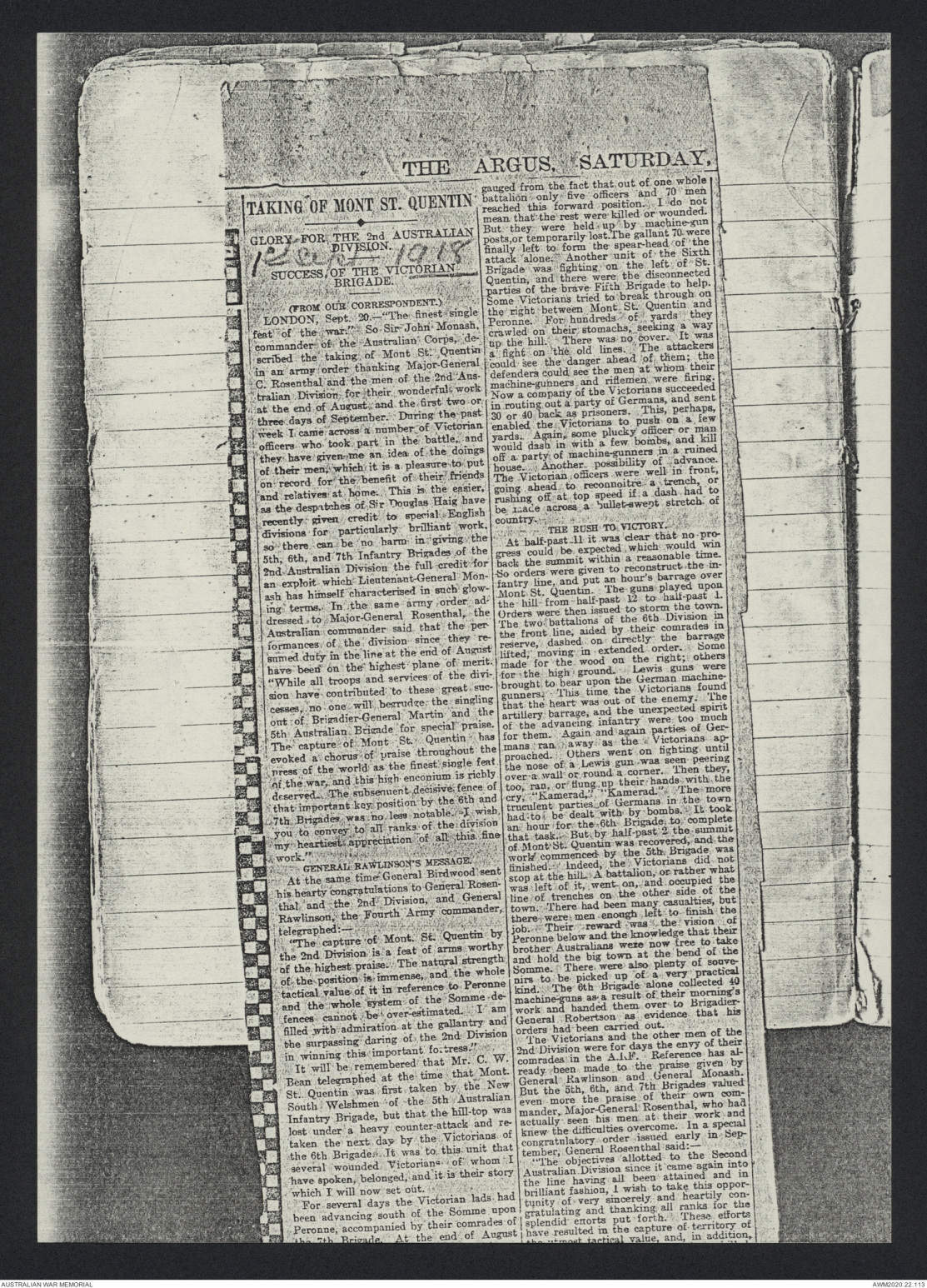
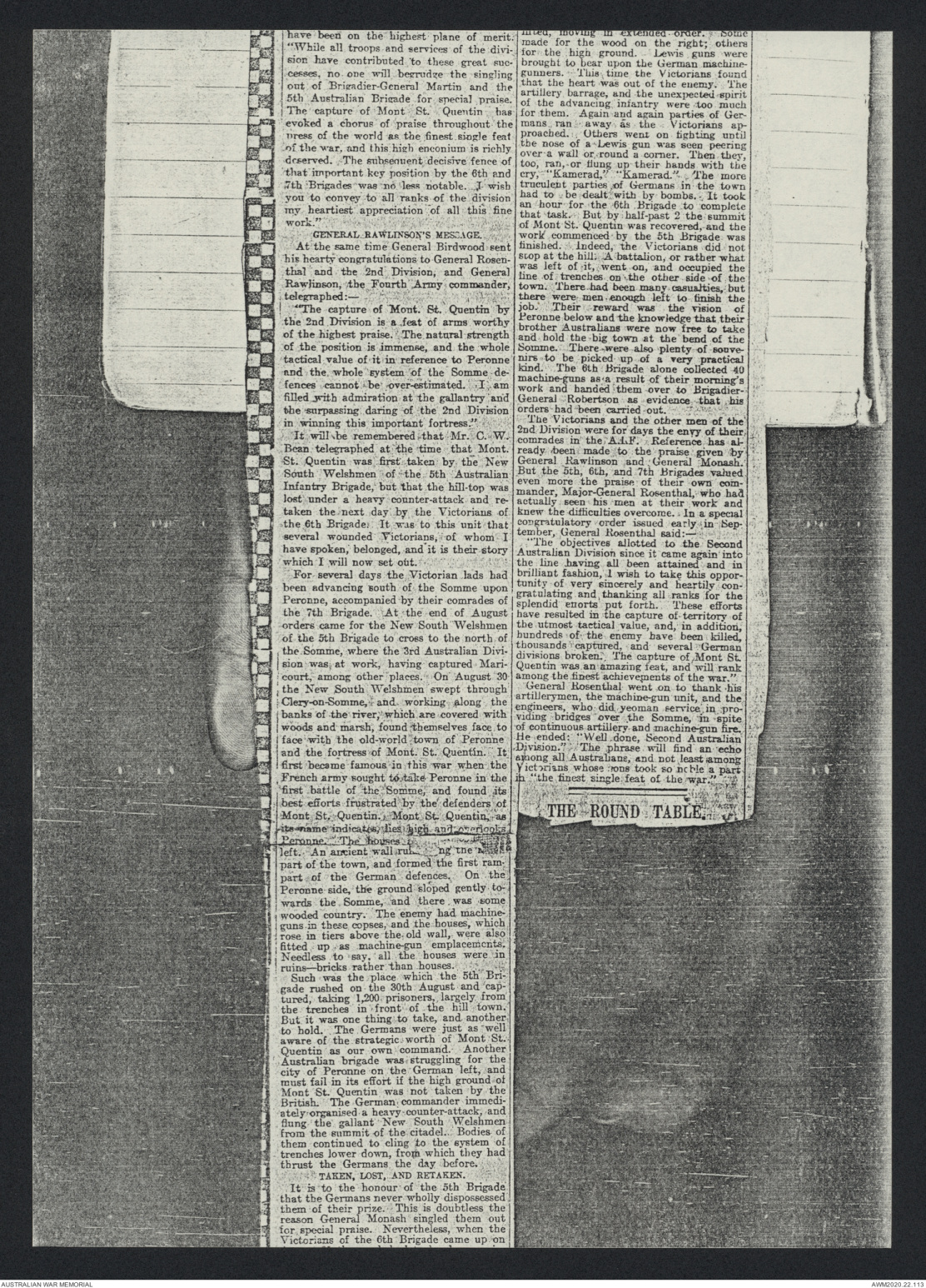

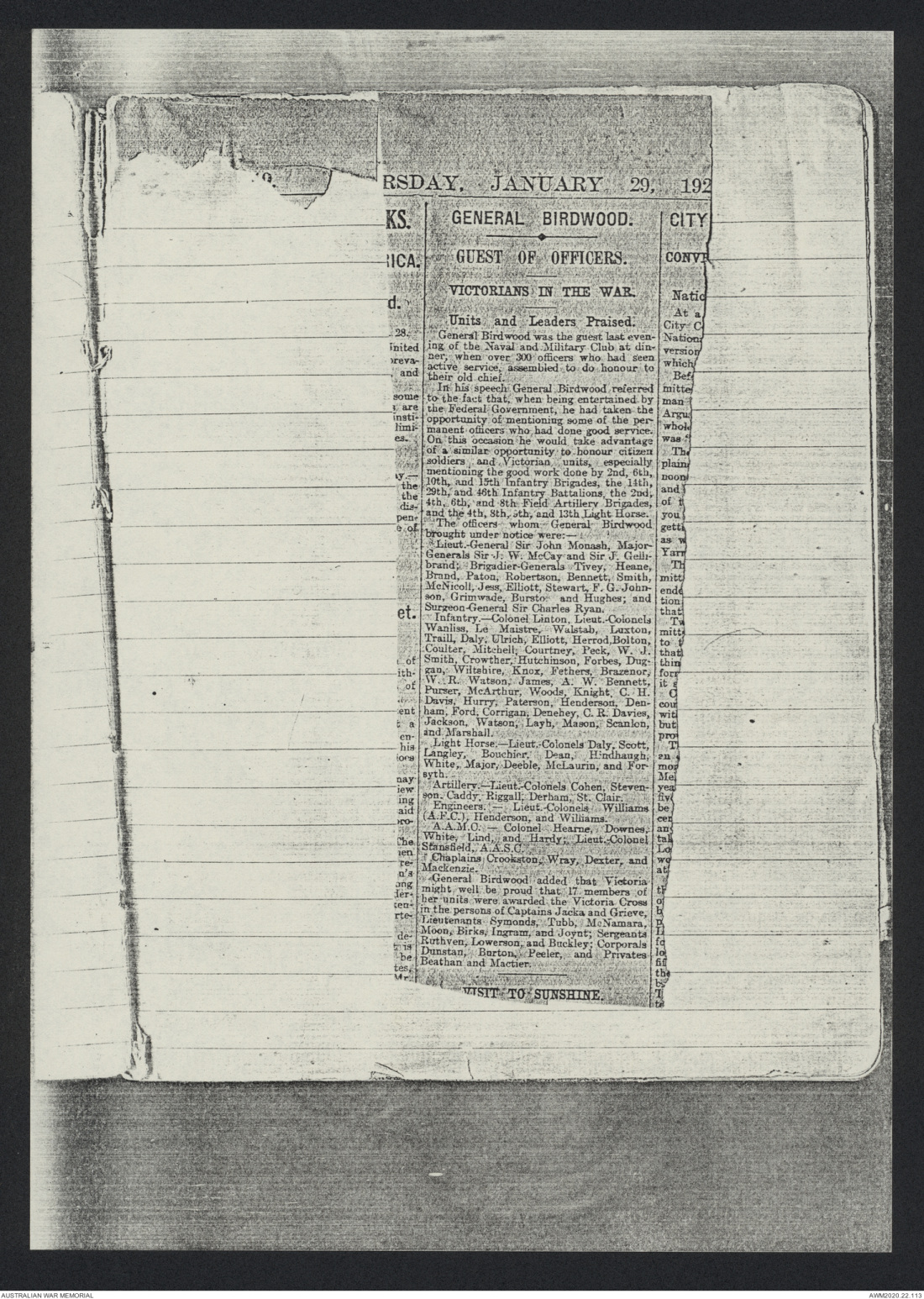
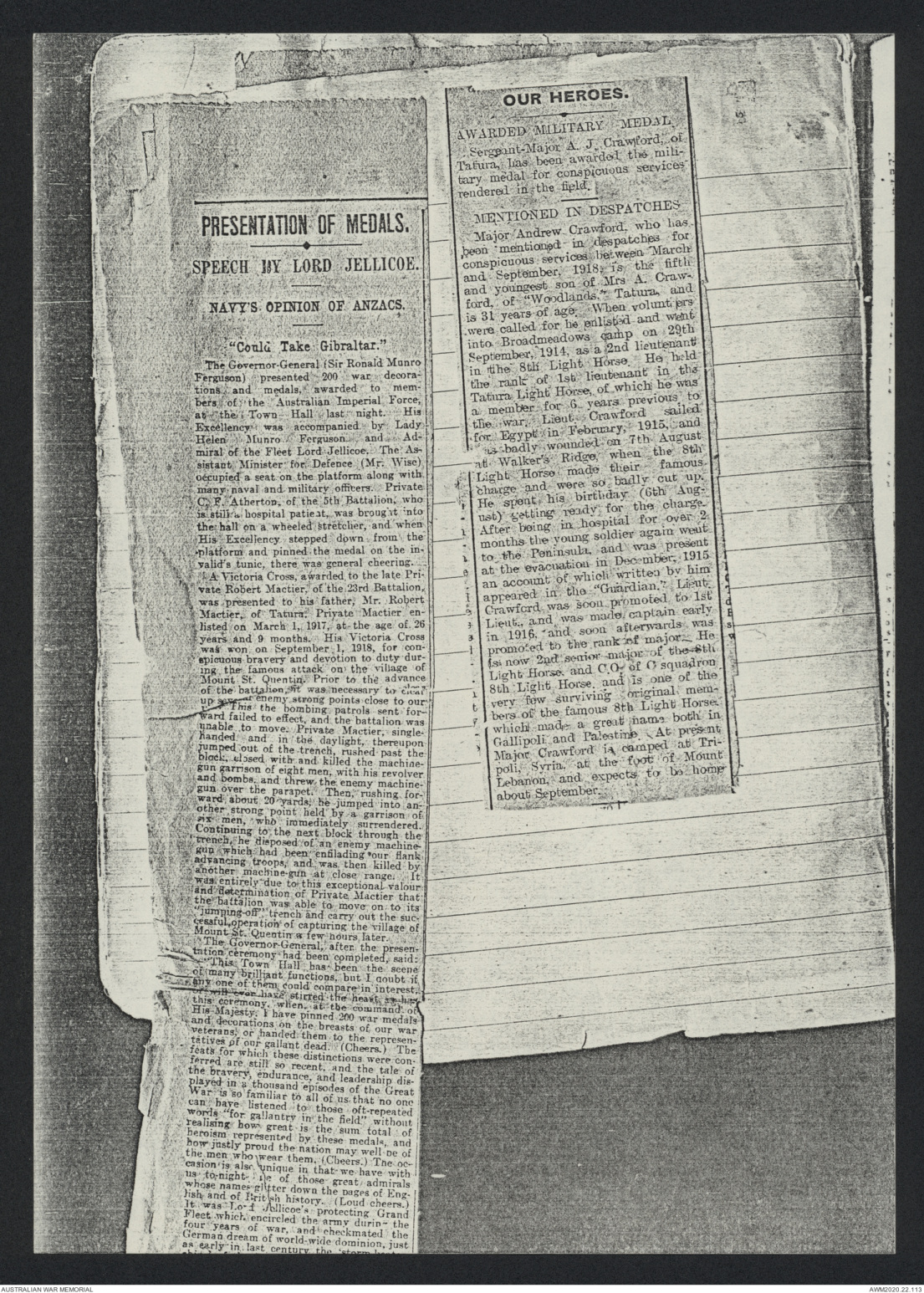




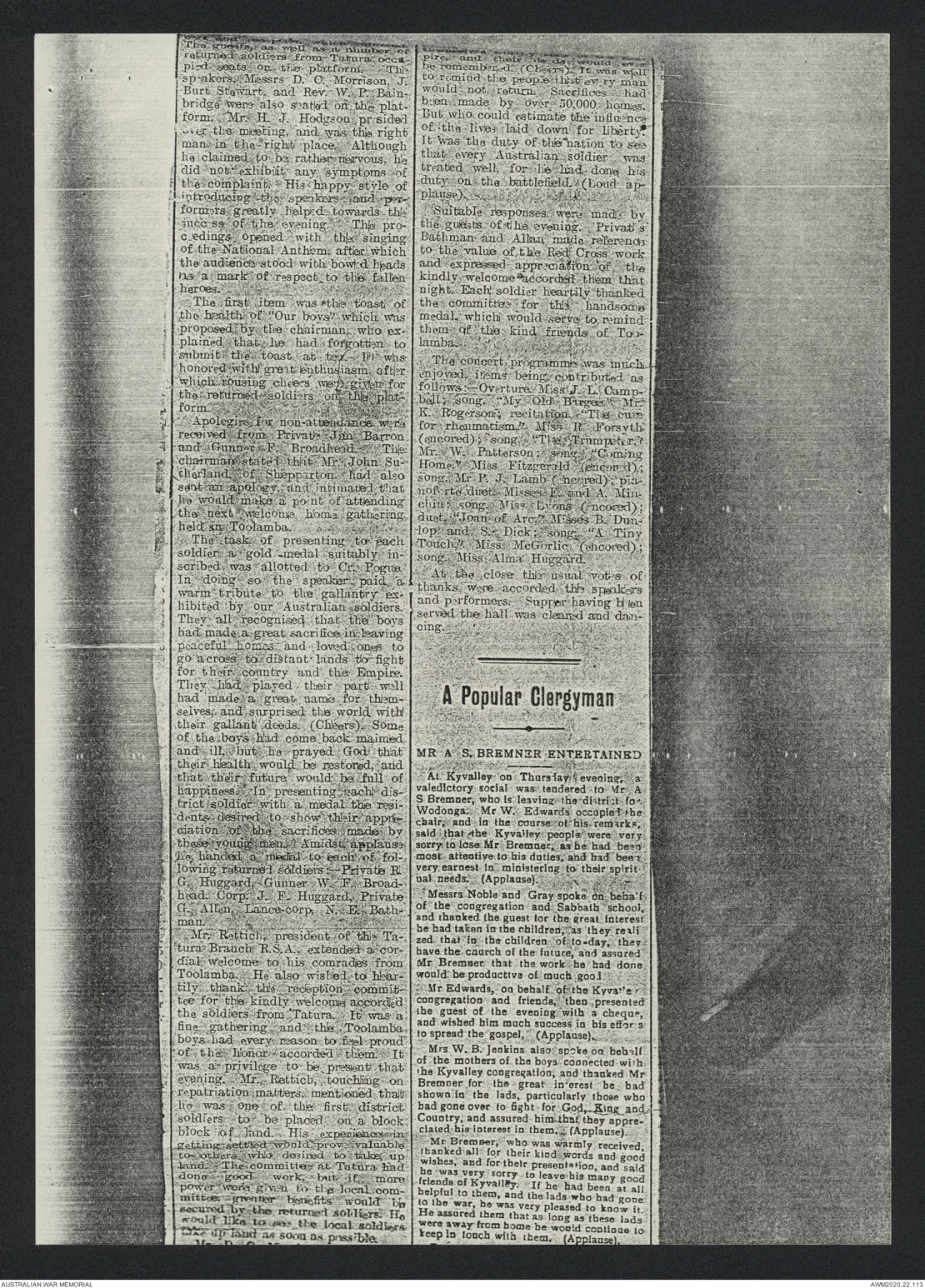
Page 1 - THE ARGUS, SATURDAY, 23 NOV 1918 Page 8
TAKING OF MONT ST. QUENTIN
GLORY FOR THE 2nd AUSTRALIAN
DIVISION
[*1st Sept 1918*]
SUCCESS OF THE VICTORIAN
BRIGADE
(FROM OUR CORRESPONDENT)
LONDON, Sept. 20 - "The finest single
feat of the war." So Sir John Monash,
commander of the Australian Corps, described
the taking of Mont St. Quentin
in an army order thanking Major-General
C. Rosenthal and the men of the 2nd Australian
Division for their wonderful work
at the end of August, and the first two or
three days of September. During the past
week I came across a number of Victorian
officers who took part in the battle, and
they have given me an idea of the doings
of their men, which it is a pleasure to put
on record for the benefit of their friends
and relatives at home. This is the easier
as the despatches of Sir Douglas Haig have
recently given credit to special English
divisions for particularly brilliant work,
so there can be no harm in giving the
5th, 6th, and 7th Infantry Brigades of the
2nd Australian Division the full credit for
an exploit which Lieutenant-General Monash
has himself characterised in such glowing
terms. In the same army order addressed
to Major-General Rosenthal, the
Australian commander said that the performances
of the division since they resumed
duty in the line at the end of August
have been on the highest place of merit.
"While all troops and services of the division
have contributed to these great successes,
no one will begrudge the singling
out of Brigadier-General Martin and the
5th Australian Brigade for special praise.
The capture of Mont St. Quentin has
evoked a chorus of praise throughout the
press of the world as the finest single feat
of the war, and this high enconium is richly
deserved. The subsequent decisive fence of
that important key position by the 6th and
7th Brigades was no less been notable. I wish
you to convey to all ranks of the division
my heartiest appreciation of all this fine
work."
GENERAL RAWLINSON'S MESSAGE
At the same time General Birdwood sent
his hearty congratulations to General Rosenthal
and the 2nd Division, and General
Rawlinson, the Fourth Army commander,
telegraphed:-
"The capture of Mont, St. Quentin by
the 2nd Division is a feat of arms worthy
of the highest praise. The natural strength
of the position is immense, and the whole
tactical value of it in reference to Peronne
and the whole system of the Somme defences
cannot be over-estimated. I am
filled with admiration at the gallantry and
the surpassing daring of the 2nd Division
in winning this important fortress."
It will be remembered that Mr. C. W.
Bean telegraphed at the time that Mont.
St. Quentin was first taken by the New
South Welshmen of the 5th Australian
Infantry Brigade, but that the hill-top was
lost under a heavy counter-attack and retaken
the next day by the Victorians of
the 6th Brigade. It was to this unit that
several wounded Victorians of whom I
have spoken, belonged, and it is their story
which I will now set out.
For several days the Victorian lads had
been advancing south of the Somme upon
Peronne, accompanied by their comrades of
the 7th Brigade. At the end of August
[missing text supplied from the following 2 pages]
orders came for the New South Welshmen
of the 5th Brigade to cross to the north of
the Somme, where the 3rd Australian Division
was at work, having captured Maricourt,
among other places. On August 30
the New South Welshmen swept through
Clery-on-Somme, and working along the
banks of the river, which are covered with
weeds and marsh, found themselves face to
face with the old-world town of Peronne
and the fortress of Mont St Quentin. It
first became famous in this way when the
French army sought to take Peronne in the
first battle of the Somme, and found its
best efforts frustrated by the defenders of
Mont St. Quentin. Mont St Quentin as
its name indicates lies high and overlooks
Peronne. The houses are in terrace-like
formation, the houses being higher on the
left. An ancient wall runs the lower
part of the town, and formed the first rampart
of the German defences. On the
Peronne side, the ground sloped gently towards
the Somme, and there was some
wooded country. The enemy had machine-guns
in these copses, and the houses, which
rose in tiers above the old wall, were also
fitted up as machine-gun emplacements.
Needless to say, all the houses were in
ruins—bricks rather than houses.
Such was the place which the 5th Brigade
rushed on the 30th August and captured
taking 1,200 prisoners, largely from
the trenches in front of the hill town.
But it was one thing to take, and another
to hold. The Germans were just as well
aware of the strategic worth of Mont St.
Quentin as our own command. Another
Australian brigade was struggling for the
city of Peronne on the German left, and
must fail in its effort if the high ground of
Mont St. Quentin was not taken by the
British. The German commander immediately
organised a heavy counter-attack, and
flung the gallant New South Welshmen
from the summit of the citadel. Bodies of
them continued to cling to the system
of trenches lower down, from which they had
thrust the Germans the day before.
TAKEN, LOST, AND RETAKEN
It is to the honour of the 5th Brigade
that the Germans never wholly dispossessed
them of their prize. This is doubtless the
reason General Monash singled them out
for special praise. Nevertheless, when the
Victorians of the 6th Brigade came up on
August 31 the work had to be done again.
Mont St Quentin still remained to be
taken. Like the 5th Brigade, the Victorians
came through Clery in artillery formation;
that is in uneven files, so that the violent
shell fire which they were experiencing
should only single out individuals and not
account for platoons or companies. While
the position on Mont St. Quentin was still
shrouded in doubt, it was clear that the
ground between the hill and Peronne itself
was not taken. A battalion of Victorians
was detailed to do that work. It marched
up to Halle, and, finally, reached a set of
trenches before St. Quentin. The shell and
machine-gun fire was so brisk from the
German position that there was no longer
room for doubt. It was evident that the
6th Brigade would have to attack at dawn.
But the Victorians were heroes of Pozieres,
Flers and Broodseinde. They rejoiced in
the prospect of work which might mean
glory. Not only were the German machine
gunners in the ruins of the brick houses,
but they were hidden in Anvil Wood, to
the south of the Mont. There was certainly
work, and there might be glory, in plenty.
Two battalions of the 6th Brigade were
detailed to commence the attack, with the
rest of the unit in reserve, the attack connecting
up with the effort of the 3rd division,
which was still going forward on the
north. Every hour the task got more difficult.
During the night strong parties of
Germans came down from the summit of
Mont St Quentin, and occupied the
trenches, from which the Australians designed
to "hop off." The Germans were
well supplied with machine-guns All this
was found out at dawn —half past 4—the
zero time of the attack being 6 o'clock.
There was all too little time for clearing
up to a position. The Germans were playing
with machine-guns across the road by
which the 6th (Victorian) Brigade had to
reach its position. Each man in the attacking
units dashed across separately.
Some, of course, were shot down, but pluck
carried the majority through.
POSSIBLE VICTORIA CROSS
Then it became necessary to rush the
trenches in which the German machine-gunners
were sitting at their ugly game.
Half measures were useless. There was no
time for flank attacks. Private Mactier
who was killed, was especially brave in
leading the rush. Those with him swept
right into the German post, killed a dozen,
possible more, Germans and captured the
rest. Then, with good aid from the artillery,
the two battalions went over the top.
It was grim work. On the right a company
was held up by German machine-gunners
in a sugar factory and other first-class
defensive positions. But the rest
went forward, using old British or German
trenches as much possible. So they came
to the foot of the town, just below the
great wall. Here they found men of the
Fifth Brigade, still hanging on to the positions
they had captured—isolated bodies,
but showing the splendid stuff they were
made of. They had tried hard to push
up the hill again but had failed. This
hanging on, and the forward rush of the
Sixth Brigade seems simple enough on
paper. But remember, machine-guns were
playing everywhere—on front, right and
rear—the last from Angle Wood, where
the Germans seemed firmly fixed. Some
idea of the carnage, and some idea of the
courage of the Victorian battalion charged
with this section of the attack, may be
gauged from the fact that out of one whole
battalion only five officers and 70 men
reached this forward position. I do not
mean that the rest were killed or wounded.
But they were held up by machine-gun
posts or temporarily lost. The gallant 70 were
finally left to form the spear-head of the
attack alone. Another unit of the Sixth
Brigade was fighting on the left of St.
Quentin, and there were the disconnected
parties of the brave Fifth Brigade to help.
Some Victorians tried to break through on
the right between Mont. St. Quentin and
Peronne. For hundreds of yards they
crawled on their stomachs, seeking a way
up the hill. There was no cover. It was
a fight on the old lines. The attackers
could see the danger ahead of them; the
defenders could see the men at whom their
machine-gunners and riflemen were firing.
Now a company of the Victorians succeeded
in routing out a party of Germans, and sent
30 or 40 back as prisoners. This, perhaps,
enabled the Victorians to push on a few
yards. Again, some plucky officer or man
would dash in with a few bombs, and kill
off a party of machine-gunners in a ruined
house. Another possibility of advance.
The Victorian officers were well in front,
going ahead to reconnoitre a trench, or
rushing off at top speed if a dash had to
be made across a bullet-swept stretch of
country.
THE RUSH TO VICTORY
At half-past 11 it was clear that no progress
could be expected which would win
back the summit within a reasonable time,
so orders were given to reconstruct the infantry
line, and put an hour's barrage over
Mont St. Quentin. The game played upon
the hill from half-past 12 to half-past 1.
Orders were then given to storm the town.
The two battalions of the 6th Division in
the front line, aided by their comrades in
reserve, dashed on directly the barrage
lifted, moving in extended order. Some
made for the wood on the right; others
for the high ground. Lewis guns were
brought to bear upon the German machine-gunners.
This time the Victorians found
that the heart was out of the enemy. The
artillery barrage, and the unexpected spirit
of the advancing infantry were too much
for them. Again and again parties of Germans
ran away as the Victorians approached.
Others went on fighting until
the nose of a Lewis gun was seen peering
over a wall or round a corner. Then they,
too, ran, or flung up their hands with the
cry, "Kamerad," Kamerad." The more
truculent parties of Germans in the town
had to be dealt with by bombs. It took
an hour for the 6th Brigade to complete
that task. But by half-past 2 the summit
of Mont St. Quentin was recovered, and the
work commenced by the 6th Brigade was
finished. Indeed, the Victorians did not
stop at the hill . A battalion, or rather what
was left of it, went on, and occupied the
line of trenches on the other side of the
town. There had been many casualties, but
there were men enough left to finish the
job. Their reward was the vision of
Peronne below and the knowledge that their
brother Australians were now free to take
and hold the big town at the bend of the
Somme. There were also plenty of souvenirs
to be picked up of a very practical
kind. The 6th Brigade alone collected 40
machine-guns as a result of their morning's
work and handed them over to Brigadier-General
Robertson as evidence that his
orders had been carried out.
The Victorians and the other men of the
2nd Division were for days the envy of their
comrades in the A.I.F. Reference has already
been made to the praise given by
General Rawlinson and General Monash.
But the 5th, 6th, and 7th Brigades valued
even more the praise of their own commander,
Major-General Rosenthal, who had
actually seen his men at their work and
knew the difficulties overcome. In a special
congratulatory order issued early in September,
General Rosenthal said :—
"The objectives allotted to the Second
Australian Division since it again came into
the line having all been attained and in
brilliant fashion, I wish to take the opportunity
of very sincerely and heartily congratulating
and thanking all ranks for the
splendid efforts put forth. These efforts
have resulted in the capture of territory of
the utmost tactical value, and, in addition,
hundreds of the enemy have been killed,
thousands captured, and several German
divisions broken. The capture of Mont St.
Quentin was an amazing feat, and will rank
among the finest achievements of the war."
General Rosenthal went on to thank his
artillery men, the machine-gun unit, and the
engineers, who did yeoman service in providing
bridges over the Somme, in spite
of continuous artillery and machine-gun fire.
He ended; “Well done, Second Australian
Division.” The phrase will find an echo
among all Australians, and not least among
Victorians whose sons took so noble a part
in “the finest single feat of the war.”
Page 2 - Brigadier General Martin. 5th Australian Brigade. Mont St. Quentin.
See original article.
Page 3 - 5th Brigade. Mont St. Quentin. 6th Brigade.
See original article.
Page 4 - RSDAY, JANUARY 29, 192
GENERAL BIRDWOOD.
GUEST OF OFFICERS.
VICTORIANS IN THE WAR.
See original article.
Units and Leaders Praised.
General Birdwood was the guest last evening
of the Naval and Military Club at dinner,
when over 300 officers who had seen
active service, assembled to do honour
to their old chief.
In his speech General Birdwood referred
to the fact that, when being entertained by
the Federal Government, he had taken the
opportunity of mentioning some of the permanent
officers who had done good service.
On this occasion he would take advantage
of a similar opportunity to honour citizen
soldiers and Victorian units, especially
mentioning the good work done by 2nd, 6th,
10th and 15th Infantry Brigades, the 14th,
29th and 46th Infantry Battalions, the 2nd,
4th, 6th, and 8th Field Artillery Brigades,
and the 4th, 8th, 9th, and 13th Light Horse.
The officers whom General Birdwood
brought under notice were:—
Lieut.-General Sir John Monash, Major-Generals
Sir J. W. McCay and Sir J. Gellibrand;
Brigadier-Generals Tivey, Heane,
Brand, Paton, Robertson, Bennett, Smith,
McNicoll, Jess, Elliott, Stewart, F. G. Johnson
Grimwade, Burston and Hughes; and
Surgeon General Sir Charles Ryan.
Infantry.—Colonel Linton, Lieut.-Colonels
Wanliss, Le Maistre, Walstab, Luxton,
Traill, Daly, Ulrich, Elliott, Herrod,Bolton,
Coulter, Mitchell Courtney, Peck, W. J.
Smith, Crowther, Hutchinson, Forbes, Dugan,
Wiltshire, Knox, Fethers, Brazenor,
W. R. Watson, James, A. W. Bennett,
Purser, McArthur, Woods, Knight, C. H.
Davis, Hurry, Paterson, Henderson, Denham,
Ford, Corrigan, Denehey, C. R. Davies,
Jackson, Watson, Layh, Mason, Scanlon,
and Marshall.
Light Horse.—Lieut.-Colonels Daly, Scott,
Langley, Bouchier, Dean, Hindhaugh,
White, Major, Deeble, McLaurin, and Forsyth.
Artillery.—Lieut.-Colonels Cohen, Stevenson,
Caddy, Riggall, Derham, St Clair
Engineers. —Lieut.-Colonels Williams
(A.F.C.) Henderson, and Williams.
A.A.M.C. —Colonel Hearnes, Downes,
White, Lind, and Hardy; Lieut.-Colonel
Stansfield, A.A.S.C.
Chaplains Crookston, Wray, Dexter, and
Mackenzie.
General Birdwood added that Victoria
might well be proud that 17 members of
her units were awarded the Victoria Cross
in the persons of Captains Jacka and Grieve,
Lieutenants Symonds, Tubb, McNamara,
Moon, Birks, Ingram, and Joynt, Sergeants
Ruthven, Lowerson, and Buckley; Corporals
Dunstan, Burton, Peeler, and Privates
Beathan and Mactier.
Page 5 - PRESENTATION OF MEDALS.
SPEECH BY LORD JELLICOE.
NAVY'S OPINION OF ANZACS.
See original article.
Page 6 - Gallantry in the Field.
See original article.
Page 7 - Mentioned in Dispatches.
See original article.
Page 8 - L.H.Regiment. Engineers. Lord Rawlinson. Victoria Cross.
See original article.
Page 9 - THE GUARDIAN, TUESDAY,
Soldiers Welcomed at
Toolamba
See original article
Page 10 - Returned soldiers from Tatura.
See original article.
 Sam scott
Sam scottThis transcription item is now locked to you for editing. To release the lock either Save your changes or Cancel.
This lock will be automatically released after 60 minutes of inactivity.